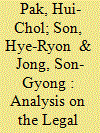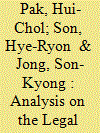| Srl | Item |
| 1 |
ID:
188817


|
|
|
|
|
| Summary/Abstract |
The 1969 Vienna Convention on the Law of Treaties is a fundamental treaty providing rights and obligations that states assume in the conclusion and implementation of treaties. Some of the provisions of the Convention, however, continue to divide the legal scholarship. One of them concerns the legal definition of jus cogens provided in Article 53 of the Vienna Convention on the Law of Treaties. The international community, particularly the International Law Commission, has exerted strenuous efforts for a long time to reach a consensus on jus cogens. Nevertheless, the legal definition of jus cogens is still open to varying interpretation among different countries and international publicists.
In this light, the article analyses the legal definition of jus cogens in three aspects. First, the connotation of the concept ‘peremptory norms of general international law’ is assessed in terms of particular, general and universal international law. Second, it analyses some problems arising in understanding the non-derogability from and modifiability of jus cogens. Finally, the article discusses some issues regarding ‘acceptance and recognition’ of jus cogens by the ‘international community of states as a whole’.
|
|
|
|
|
|
|
|
|
|
|
|
|
|
|
|
| 2 |
ID:
173227


|
|
|
|
|
| Summary/Abstract |
At present, some states are undertaking military interventions in different parts of the world, contending the ‘legitimacy’ of their i006Evocation of responsibility to protect civilians from a humanitarian crisis. Discussions at international forums concerning the concept of Responsibility to Protect (R2P) are inconclusive about its legal nature and application. While some scholars and states support the doctrine of R2P as being legitimate, others challenge or take a rather sceptical view. Divergent views seem to be originating from its incompatibilities with the rules of international law, including the Charter of the United Nations. What is controversial is that the supporters of R2P are mainly from the West, while objections to R2P are from developing countries mainly from West Asia or Africa. This raises concerns about the possibility of future applications of R2P in any of the countries in these regions or other developing countries. The article, analyses the legal nature of R2P in terms of the main principles of international law and other sources of international law and argues that the legitimacy and international legal effect of R2P are uncertain.
|
|
|
|
|
|
|
|
|
|
|
|
|
|
|
|